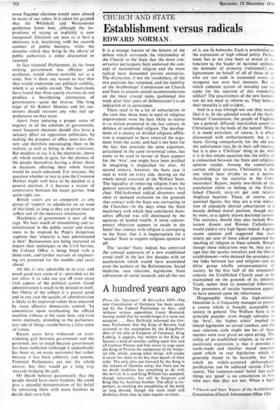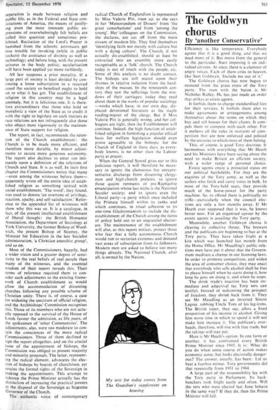Establishment versus radicals
EDWARD NORMAN .
.It is a strange feature of the history of the debate which surrounds the relationship of the Church to the State that the more con- - servative participants lia/e endorsed the con: cept of nationalised religion and the more radical have demanded private enterprise. The distinction, if not the vocabulary, of the two positions has remained, and the inability of the Archbishops' Commission on Church and State to present united recommendations on the most crucial items (published this week after four years of deliberations*) is an indication of its persistence.
There used to be a lot of subscription to the view that those most in need of religious improvement were the least likely to realise it—a notion promoted in the last century in defence of established religion. The develop- ment of a society of divided religious affilia- tion is supposed to have removed the argu- ment from the scene; and had it not been for the fact that precisely the same argument, articulated in the same reverential tones, has come to be used in favour of State support for the 'Arts', one might have been justified. in imagining it dispatched for ever. At second remove, however, the basic case is seen at work on every side, shoring up the whole moral structure of the Welfare State. The logicality of removing religion from the general spattering of public provision is less clear. Old-fashioned radical dissenters used once to demand exclusion on the grounds that contact with the State was corrupting to the Churches—in the days when the State machinery with which they considered them- selves afflicted was still dominated by the agencies of landed wealth. A more contem- porary objection appears to reside in the belief that contact with religion is corrupting to the State; that it is inappropriate for a `secular' State to support religious opinion at all.
The 'secular' State, indeed, has contrived the colossal apparatus of a new established creed itself in the last few decades with an acceleration which would have astonished even the authors of the Reformation. Social medicine, race relations, legislation, State subvention of social research, and all the rest
of it, are as bulwarks. Each is proclaimed as 'the expression of high ethical polity. Parlia- ment has at no Elie been so proud of its fuaction as the leader -of national opinion, the defender of minority- (Informed') en- lightenment on behalf of all of. thbse of us who are too sunk in outmoded mores to recognise our own best interests. But to which coherent system of morality can we apply for the sanction of this wonderful edifice? The practitioners of the new human- ism do not need to inform us. They believe
their morality is self-evident., •
And in a way (though not one they would like) it is. In the splendid words of the Arch- bishops' Commission, the people of England `see a general, diffused, inarticulate assent to Christianity in the body of the nation'. When it is made articulate. of course, it is often discounted with embarrassment; but it is there. Giving compulsorily for the old and the unfortunate may be in their self-interest, but it is also a 'Christian' thing to do. And it is in this simple equation that the utility of a connection between the State and religious opinion resides. Among the conceivable current ethical systems, Christianity is the one which least divides us as a nation. According to the statistics in the Com- missioners' Report, nearly two-thirds of the population claim to belong to the Estab- lished Church; sixty-six per cent receive Anglican baptism. These, of course, are nominal figures, but they are a true indica- tion of popularly desired subscription to a loosely defined moral position, though not. by most, to a tightly drawn doctrinal system. The statistics, should they also include Pro- testant dissent and Roman Catholicism. would yield a very high figure indeed. A quite recent opinion poll suggested that over ninety per cent of those asked supported the teaching of religion in State schools. Rough though these indications may be, they are a sign that the secular moralists and the liberal establishment—who demand the severance of the links between law and religion—are an elitist group wholly unrepresentative of society. In the first half of the nineteenth century the Established Church used to be maintained on the grounds of its inherent Truth, rather than its numerical following. The promoters of secular humanism appear to have entered upon the inheritance.
Disagreeable though this high-minded liberalism is. it frequently manages to pursue a course which is broadly acceptable to society in general. The Welfare State is in principle popular, even though subsidies to the 'Arts', the 'higher ethics' implied in liberal legislation on sexual conduct, and the race relations code might not be—if these matters were ever given an open airing. The utility of an established religion, at its most positivistic expression, is that it provides a ready-made and familiar moral sanction upon which to rear legislation which is generally found to be desirable, but for which no widely-accepted philosophical justification can be adduced outside. Chris- tianity. The 'common-sense' belief that such things are 'good' is no consolation to him who says that they are not. When a legal
• Church and Stale. Report of the Archbishops' Commission (Church Information Office 12s)
separation is made between religion and public life, as in the Federal and State con- stitutions of America, the means of justify- ing even the most innocent public ex- pressions of overwhelmingly felt beliefs are called into question and sometimes pro- hibited. Recitation of the Lord's Prayer is banished from the schools; astronauts get into trouble for invoking (while in public rockets) the assistance of divinity as well as technology; and before long, with the present seizures in the body politic, secularisation will have been applied yet more ruthlessly.
All law supposes a prior morality. If a large part of society is least divided by con- tinuing a loose subscription to a received creed the society so benefited ought to hold on to what it has got. The establishment of religion in this country may be a legal anomaly, but it is felicitous one. It is there- fore extraordinary that those who hold so moralistic a view of the State as to credit it with the right to legislate on such matters as race relations are not infrequently also those who object most vigorously to the mainten- ance of State support for religion.
The report, in fact, recommends the reten- tion of the Church establishment: the Church is to be made more efficient, and therefore more durable, by minor adjust- ments to secure more generous autonomy. The report also declines to enter too inti- mately upon a definition of the relations of Church and State. It is as well. In their first chapter the Commissioners notice that many —even among the witnesses before them— apparently wrote off the entire idea of estab- lished religion as something tainted with social establishment. The word', they found, was used to denote 'an overtone of privilege, reaction, apathy, and self-satisfaction.' Refer- ence to the appended list of witnesses will show why this was so. It is a catalogue, in fact, of the present intellectual establishment of liberal thought: the British Humanist Association, the Department of Sociology at York University, the former Bishop of Wool- wich, the present Bishop of Stepney, the Minister for Education in the late Socialist administration, 'a Christian anarchist group', and so on.
Most of the Commissioners, happily, had a wider vision and a greater degree of sensi- tivity to the real beliefs of real people than many of the witnesses, and the essential wisdom of their report reveals this. Their terms of reference required them to con- sider such adjustments to the existing frame- work of Church establishment as would allow the accommodation of dissenting churches following any possible scheme of Christian unity. There is, of course, a case for widening the spectrum of official religion, and the Archbishops' Commission recognises this. Those of its members who are not actu- ally opposed to the survival of the House of Lords favour the admission, as life peers, of the spokesmen of 'other Communions'. The adjustments, alas, were too moderate to con- tain the consciences of the more radical Commissioners. Three of them declined to sign the report altogether, and on the crucial issue of the appointment of bishops, the Commission was obliged to present majority and minority proposals. The latter, represent- ing the radical element, advocates the elec- tion of bishops by boards of churchmen, yet retains the formal rights of the Sovereign in making the appointments. This attempt to sidestep the Prime Minister actually has the distinction of increasing the practical powers at the disposal of the Sovereign as Supreme Governor of the Church.
The authentic voice of contemporary radical Church of Englandism is represented by Miss Valerie Pitt, risen up, as she says in her 'Memorandum of Dissent' from 'the great conurbations' and from 'among the young'. Her 'colleagues on the Commission, she declares, are cut off from the main stream of modern life. They find themselves 'identifying faith not merely with culture but with a dying culture'. The Church, if not actually dis-established, should at least be converted into an assembly more easily recognisable as a 'folk' church. The Church today is out of touch with the people, etc. Some of this analysis is no doubt correct. The bishops are still seated upon their thrones in relative isolation from the hard- ships of the masses. In the nineteenth cen- tury they saw the sufferings from the win- dows of their carriages; today they read about them in the works of popular sociology —works which have, in our own day, dis- placed devotional literature as the staple reading-matter of the clergy. But if Miss Valerie Pitt is generally wrong, and her col- leagues are right, then the Establishment will continue. Indeed, the high function of estab- lished religion in furnishing a popular ethical basis for welfare legislation should even prove agreeable to the bishops; for the Church of England in these days, as every- body knows, is no other than the Labour party at prayer.
When the General Synod gives ear to this judicious report, it will therefore be neces- sary to ignore the clamorous but unrepre- sentative discharge from dissenting clergy- men and high-church prelates; to ignore those quaint remnants of pre-Raphaelite emancipation whose last niche is the National Secular society; and to ignore even the Liberal party—a party which once included the Primate himself within its ranks and which continues, in ritual adhesion to its one-time Gladstonianism to include the dis- establishment of the Church among the items of policy held out to an ungrateful elector- ate. The maintenance of the establishment will also, as this report notices, protect those who fear that a fully autonomous Church would run to sectarian extremes and demand vast areas of subscription from its followers. Modern men are asked to believe too many things already. The National Church, after all, is owned by the Nation.
My text for today comes from The Guardian's supplement on housing











































 Previous page
Previous page